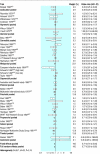beta Blockade after myocardial infarction: systematic review and meta regression analysis
- PMID: 10381708
- PMCID: PMC31101
- DOI: 10.1136/bmj.318.7200.1730
beta Blockade after myocardial infarction: systematic review and meta regression analysis
Abstract
Objectives: To assess the effectiveness of beta blockers in short term treatment for acute myocardial infarction and in longer term secondary prevention; to examine predictive factors that may influence outcome and therefore choice of drug; and to examine the clinical importance of the results in the light of current treatment.
Design: Systematic review of randomised controlled trials.
Setting: Randomised controlled trials.
Subjects: Patients with acute or past myocardial infarction.
Intervention: beta Blockers compared with control.
Main outcome measures: All cause mortality and non-fatal reinfarction.
Results: Overall, 5477 of 54 234 patients (10.1%) randomised to beta blockers or control died. We identified a 23% reduction in the odds of death in long term trials (95% confidence interval 15% to 31%), but only a 4% reduction in the odds of death in short term trials (-8% to 15%). Meta regression in long term trials did not identify a significant reduction in effectiveness in drugs with cardioselectivity but did identify a near significant trend towards decreased benefit in drugs with intrinsic sympathomimetic activity. Most evidence is available for propranolol, timolol, and metoprolol. In long term trials, the number needed to treat for 2 years to avoid a death is 42, which compares favourably with other treatments for patients with acute or past myocardial infarction.
Conclusions: beta Blockers are effective in long term secondary prevention after myocardial infarction, but they are underused in such cases and lead to avoidable mortality and morbidity.
Figures



Comment in
- ACP J Club. 2000 Jan-Feb;132(1):4
-
beta Blockade after myocardial infarction. Beta blockers have key role in reducing morbidity and mortality after infarction.BMJ. 2000 Feb 26;320(7234):581. BMJ. 2000. PMID: 10688573 Free PMC article. No abstract available.
-
beta Blockade after myocardial infarction. Absence of evidence is failure of research policy.BMJ. 2000 Feb 26;320(7234):581. BMJ. 2000. PMID: 10744406 No abstract available.
References
-
- Viskin S, Barron HV. β-Blockers prevent cardiac death following myocardial infarction: so why are so many infarct survivors discharge without β-blockers? Am J Cardiol. 1996;78:821–822. - PubMed
-
- Yusuf S, Peto R, Lewis J, Collins R, Sleight P. β-Blockade during and after myocardial infarction: an overview of the randomized trials. Prog Cardiovasc Dis. 1985;27:335–371. - PubMed
-
- Smith TC, Spiegelhalter DJ, Thomas A. Bayesian approaches to random-effects meta analysis: a comparative study. Stats Med. 1995;14:2685–2699. - PubMed
Publication types
MeSH terms
Substances
LinkOut - more resources
Full Text Sources
Other Literature Sources
Medical
Miscellaneous
